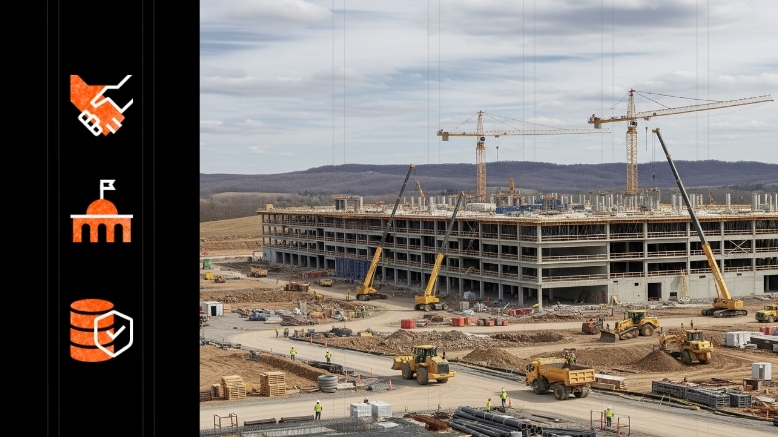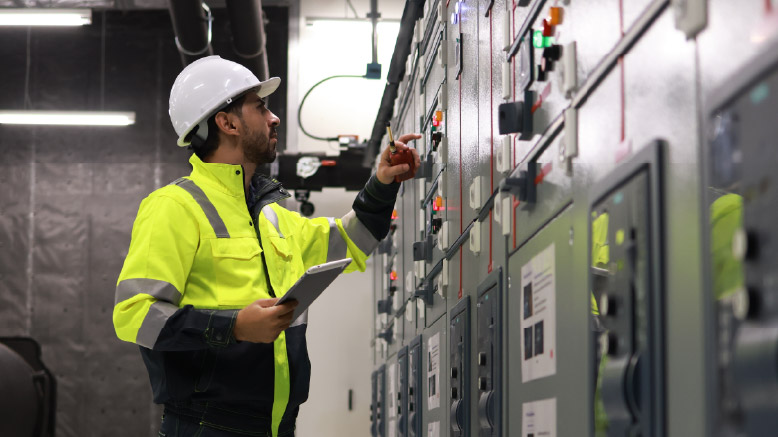— 5 min read
The Race to Build Tomorrow’s Data Centers: Balancing Efficiency & Quality


Last Updated Sep 23, 2025

Trevor Dielmann
Enterprise Solution Specialist, Data Centers
Trevor Dielmann brings a decade of experience in construction and project management to the table. His background began in general contracting, providing a solid foundation in the industry before transitioning to the semiconductor sector where he specialized in the construction of cutting-edge R&D labs specifically designed for the advancement of data center specific chipsets. Trevor’s unique blend of experiences provides a valuable perspective by fostering a deep understanding of client needs and project complexities.

Marlissa Collier
34 articles
Marlissa Collier is a journalist whose work focuses on the intersections of business, technology, policy and culture. Her work has been featured in digital and print formats with publications such as the Dallas Weekly, XO Necole, NBCU Comcast, the Dallas Nomad, CNBC, Word in Black and Dallas Free Press. Marlissa holds an undergraduate degree in Construction Engineering from California State University, Long Beach and an MBA from Southern Methodist University’s Cox School of Business.
Last Updated Sep 23, 2025

The digital revolution continues to fuel an unprecedented demand for data centers. From hyperscale giants to distributed edge facilities, the pressure is on in the construction industry to build faster and at scale. However, this race to meet demand cannot come at the expense of quality and performance, the foundational pillars of reliable data center operations. The key challenge lies in striking a delicate balance: achieving construction efficiency without compromising the robustness and uptime that these critical facilities require.
The sheer volume of data being generated and processed necessitates an accelerated pace of data center development. The rise of AI, IoT, and cloud computing further intensifies this demand, pushing construction firms to find innovative ways to expedite build times. This article examines the challenges the industry faces in building efficiently while constructing facilities that meet the highest standards of reliability and performance.
Table of contents
Strategies for Efficient, High-Quality Data Center Construction
As the industry seeks to meet the escalating demand for data centers without sacrificing the foundational principles of quality and performance, several key strategies have emerged.
Using Modular and Prefabricated Construction
One of the most promising pathways to achieving this balance lies in the strategic adoption of modular and prefabricated construction. By shifting a significant portion of the build process to controlled off-site environments, construction firms can achieve several key efficiencies. These include streamlined workflows, reduced on-site labor and coordination complexities, and enhanced quality control through standardized processes.
Standardizing Designs
The standardization of designs is emerging as a key strategy for enhancing efficiency without compromising quality. By developing repeatable design blueprints for different types of data centers (e.g., edge, colocation, hyperscale), construction firms can streamline the engineering and procurement processes, leading to faster project initiation and execution.
While customization may still be required, having a core set of standardized components and layouts accelerates the overall build process and allows for lessons learned from previous projects to be readily applied.
Harnessing Data and Technology
The intelligent use of data and technology throughout the construction lifecycle is also pivotal in this balancing act. Building Information Modeling (BIM) enables virtual design and clash detection, minimizing errors and rework on site, thereby improving both efficiency and quality.
Project management platforms can help facilitate real-time communication, documentation and quality control checks, so projects stay on schedule and meet stringent specifications.
When firms leverage data analytics from past projects, they can identify bottlenecks, optimize resource allocation and proactively mitigate potential quality issues, leading to more efficient and higher-performing builds.
Optimizing the Supply Chain
To meet the escalating demand for data centers, the industry is also witnessing a greater emphasis on supply chain optimization. The timely delivery of mission-critical equipment and materials is paramount to maintaining project schedules without compromising quality.
Establishing strong relationships with reliable suppliers, implementing efficient logistics management and potentially even exploring strategic partnerships for bulk procurement can contribute significantly to both efficiency and cost-effectiveness.
Unwavering Quality Assurance: Setting the Standard for a Rapidly Growing Sector
The pursuit of efficiency cannot overshadow the critical need for robust quality assurance and quality control (QA/QC) processes. Implementing rigorous inspection protocols and using meticulous documentation help verify that the constructed facilities meet the required performance standards. As the demand for data centers intensifies, construction firms that can demonstrate a commitment to both speed and uncompromising quality will be best positioned to capitalize on this growth.
Organizations like the Uptime Institute play a pivotal role in establishing and promoting QA standards within the data center industry. Their globally recognized Tier Standard provides a framework for evaluating data center infrastructure based on redundancy and fault tolerance, offering a clear benchmark for quality and reliability.
While not a direct regulatory body for construction, the Uptime Institute's Tier Certifications for Design Documents (TCDD) and Constructed Facility (TCFF) guide construction companies in adhering to specific quality benchmarks from the initial design phase through to the completed build. Achieving these certifications demonstrates a commitment to meeting stringent performance requirements, even under pressure to build quickly.
Beyond the Uptime Institute, other industry bodies and standards also contribute to quality assurance in data center construction. ANSI/TIA-942, for example, is another widely adopted standard that specifies minimum requirements for telecommunications infrastructure in data centers, encompassing aspects like architectural design, electrical and mechanical systems, and security. Compliance with such standards, often sought by data center operators and demanded by end-users, necessitates rigorous QA/QC processes during construction.
Furthermore, the increasing focus on sustainability has led to the adoption of standards like LEED (Leadership in Energy and Environmental Design), which, while primarily focused on environmental performance, also implies a level of quality in material selection and construction practices. Achieving LEED certification requires thorough documentation and verification, adding another layer of quality assurance to the building process.
These organizations and standards provide construction companies with clear guidelines and frameworks to ensure quality is not sacrificed for speed. By adhering to these benchmarks and pursuing relevant certifications, firms can demonstrate their capability to deliver reliable, high-performing data centers even as the pace of development accelerates. This commitment to quality ultimately builds trust with clients and ensures the long-term viability of the constructed infrastructure.
Building for the Future with Speed and Reliability
The challenge of building efficient, high-performing data centers to meet surging demand requires a multifaceted approach. By embracing modular construction, standardizing designs, leveraging data and technology, optimizing supply chains, and maintaining a steadfast commitment to quality assurance, the construction industry can effectively navigate this dynamic landscape.
The future of data center construction depends on the ability to strike this balance, so the digital infrastructure of tomorrow is not only built quickly but also built to last, with unwavering quality and performance at its core.
Free AI in Construction Course with Hugh Seaton
Start learning today with industry expert Hugh Seaton and discover how AI can boost efficiency, reduce risk, and transform your projects.

Was this article helpful?
Thank you for your submission.
100%
0%
You voted that this article was . Was this a mistake? If so, change your vote
Scroll less, learn more about construction.
Subscribe to The Blueprint, Procore’s construction newsletter, to get content from industry experts delivered straight to your inbox.
By clicking this button, you agree to our Privacy Notice and Terms of Service.
Thank you!
You’re signed up to receive The Blueprint newsletter from Procore. You can unsubscribe at any time.
Categories:
Written by

Trevor Dielmann
Enterprise Solution Specialist, Data Centers | Procore Technologies
Trevor Dielmann brings a decade of experience in construction and project management to the table. His background began in general contracting, providing a solid foundation in the industry before transitioning to the semiconductor sector where he specialized in the construction of cutting-edge R&D labs specifically designed for the advancement of data center specific chipsets. Trevor’s unique blend of experiences provides a valuable perspective by fostering a deep understanding of client needs and project complexities.
View profile
Marlissa Collier
34 articles
Marlissa Collier is a journalist whose work focuses on the intersections of business, technology, policy and culture. Her work has been featured in digital and print formats with publications such as the Dallas Weekly, XO Necole, NBCU Comcast, the Dallas Nomad, CNBC, Word in Black and Dallas Free Press. Marlissa holds an undergraduate degree in Construction Engineering from California State University, Long Beach and an MBA from Southern Methodist University’s Cox School of Business.
View profileExplore more helpful resources

Building Intelligence: How AI & Data Are Rewiring Construction for the Digital Age
As data center construction surges to meet the demands of AI, cloud computing, weekend streaming binges and real-time digital services, the pressure being put on builders by owners has reached...

Power, Politics & Permits: The External Forces Shaping Data Center Development
As the need for digital infrastructure accelerates, data centers have become essential to powering the world’s digital economy. Yet, behind every hyperscale facility is a complex web of external forces...

The New Frontier: How Data Centers Are Pushing the Limits of Construction
The digital world never sleeps — and as such, neither can the infrastructure powering it. As demand for cloud services, artificial intelligence and streaming data continues to surge, data centers...

The Top 5 MEP Challenges of Data Centers
Data centers are unique builds that come with unique challenges. MEP contractors stepping up to build data centers are sure to encounter the complexity of systems and the demands of scalability,...
Free Tools
Calculators
Use our calculators to estimate the cost of construction materials for your next project.
Templates
Find a template to help you with your construction project tasks.
Material Price Tracker
Get the latest U.S. retail prices and view historical trends for common building materials.
Glossary
Explore key terms and phrases used in the industry.
